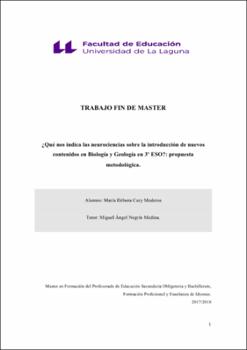¿Qué nos indica las neurociencias sobre la introducción de nuevos contenidos en Biología y Geología en 3º ESO?: Propuesta metodológica
Author
Cury Mederos, María DeboraDate
2018Abstract
Because the advance of neuroscience we know how the human brain works when it
is learning. This knowledge has caused that the educators have a new perspective to
carry out our work and promote the learning of our students. Knowledge of the
physiological mechanisms that occur at the brain level when the learning process is
done has discovered a tool with a high capacity and potential that makes us wonder if
our work can be improved and, from there, emerge the idea of neuroeducation.
This paper intends to review all the knowledge that has been acquired thanks to
advances in neuroscience and how this knowledge can be used by teachers to improve
the quality of their teaching as well as do a general proposal for the 3º ESO curriculum
and a didactic proposal, carried out in practice, with a methodology that pretend to
apply the knowledge we have about the brain processes that lead to learning, favoring
the emotional mechanisms that arouse the curiosity in students. Gracias al avance de la neurociencia podemos conocer cómo funciona el cerebro del
ser humano a la hora de aprender. Este conocimiento ha ocasionado que los educadores
nos veamos ante una nueva perspectiva para llevar a cabo nuestra labor y favorecer el
aprendizaje de nuestros alumnos. El conocimiento de los mecanismos fisiológicos que
se producen a nivel cerebral cuando se realiza el proceso de aprendizaje ha descubierto
una herramienta con una alta capacidad y potencialidad que nos hace plantearnos si el
trabajo realizado hasta ahora es mejorable y, de ahí, surgió la idea de neuroeducación.
En este trabajo se pretende realizar un repaso a todos los conocimientos que se han
ido adquiriendo gracias a los avances en la neurociencia y cómo esos conocimientos
pueden ser utilizados por el profesorado para mejorar la calidad de su enseñanza a la
vez que se hace una propuesta general para el currículo de 3º de la ESO y una propuesta
didáctica, llevada a la práctica, con una metodología que pretende aplicar los
conocimientos que se tienen sobre los procesos cerebrales que llevan al aprendizaje,
favoreciendo los mecanismos emocionales que suscitan la curiosidad en el alumnado.





